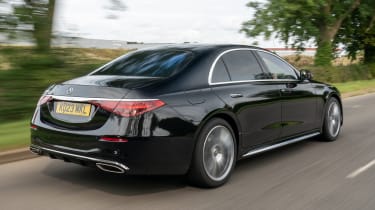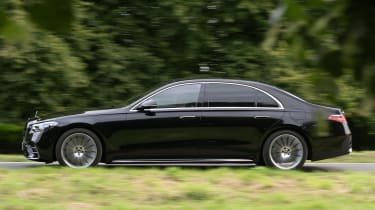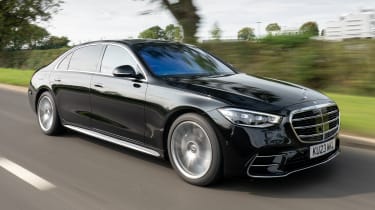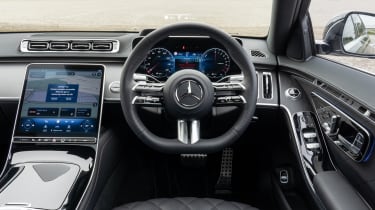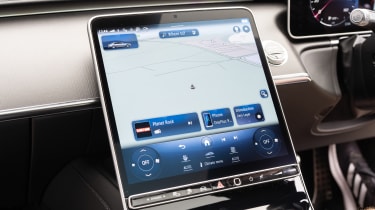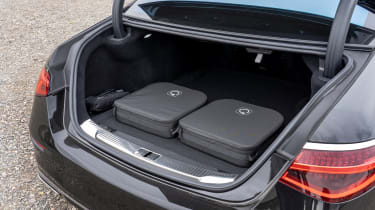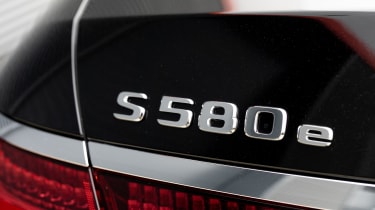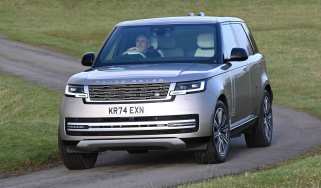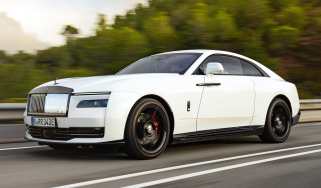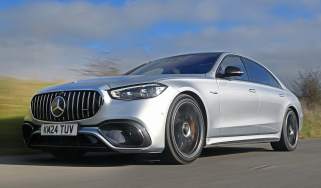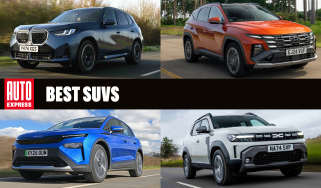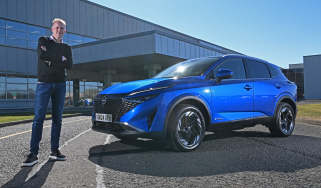Mercedes S-Class review
The once imperious quality of the Mercedes S-Class may have slipped a little, but the technical highlights are typically eye-catching

Once the undisputed king of saloon cars, the Mercedes S-Class still retains much of its traditional appeal. It’s a supremely luxurious, refined and technology-laden conveyance for affluent and successful individuals, and the current seventh-generation car has a bold face that enhances its opulent style.
Inside, there’s a mind-bending array of tech innovations, including augmented reality navigation, 3-D digital displays and face recognition. Still, we’ve got a sense that Merc’s engineers have been lured too far down the digital rabbit hole, and core values have suffered.
While back seat passengers will be blissfully oblivious to the flimsy feel of steering wheel controls and other questionable fit and finish choices, their chauffeurs may regret the passing of old certainties.
About the Mercedes S-Class
This is the seventh generation of the Mercedes S-Class, a flagship saloon model first introduced in 1972 on the coattails of an illustrious lineage of even older Mercedes luxury models dating back to the dawn of motoring.
As such the S-Class has always been the company’s most important brand statement, encapsulating the best of what its engineers, designers and craftspeople can do. It’s an approach summed up in the company’s current motto, ‘The Best or Nothing’ which – apart from resonating with Frank Sinatra fans – is an apt description of the qualities the S-Class has brought to the luxury car arena over the years.
But we live in confusing times on the cusp of a wholesale switchover to electric vehicles and digital interfaces, even the S-Class must be wondering about its place in the world. It’s offered with mild- or plug-in hybrid powertrains, an impressive array of electronic and infotainment tech, and the usual opulent creature comforts expected of a luxury car. However, the arrival of the all-electric EQS casts a shadow over whether the S-Class will retain its place at the top of the Mercedes line-up.
Used - available now

2020 Mercedes
S Class
18,679 milesAutomaticDiesel2.9L
Cash £44,029
2020 Mercedes
S Class
38,394 milesAutomaticPetrol3.0L
Cash £48,240
2019 Mercedes
S Class
47,000 milesAutomaticDiesel2.9L
Cash £29,995
2017 Mercedes
S Class
38,500 milesAutomaticDiesel3.0L
Cash £26,795Could this seventh-generation S-Class be more of a stop-gap, and that Mercedes has diverted its best resources to develop an heir to the throne? It’s a theory that might account for some of the criticism we feel able to level in some surprising areas, and which made it easier than Mercedes might have hoped for us to rule the S-Class out as a Luxury Car of the Year award winner in favour of the BMW i7.
Even though the black pump continues to fall out of favour with UK drivers, Mercedes still expects most S-Class buyers to go for diesel power. There’s the choice of two six-cylinder diesels: a 308bhp S 350 d or 361bhp S 450 d 4MATIC. The latter is the first four-wheel drive S-Class to be officially sold in the UK.
A single petrol-powered S 500 model is also available. This six-cylinder engine produces 442bhp and 560Nm of torque, and a 0-62mph time of 4.7 seconds makes it the fastest non-AMG S-Class.
There are two plug-in hybrid models to choose from for those seeking to lower their emissions, but the differences between them are surprisingly broad.
The S-Class best-suited to company car drivers is the S 580 e, which produces the lowest emissions of the range and offers up to 68 miles of pure-electric driving. At the other end of the plug-in S-Class scale is the AMG S 63 e Performance; this comes with a 4.0-litre V8 and an electric motor to produce a total output of 792bhp. Its primary focus is power rather than efficiency.
The current S-Class lineup consists of three core trim levels: AMG-Line Premium, Long AMG Line Premium Plus and Long AMG Line Premium Plus Executive. Long refers to the long-wheelbase model (an option on the base AMG-Line Premium trim), which increases the S-Class’ length from an already notable 5,210mm to 5,320mm.
Standard kit includes 20-inch alloys, Nappa leather upholstery, soft-close doors, heated front and rear seats, driver and passenger memory settings, keyless go, wireless charging, a 360-degree camera system, and remote parking.
Moving up to Premium Plus throws in Mercedes’ augmented reality head-up display, digital headlamps, massaging front seats, heated armrests, and larger 21-inch wheels. Executive versions include electric rear blinds, rear seat control of front passenger seat adjustment, an extra rear footrest, and a removable tablet that pops out of the central armrest.
Although the standard lineup has AMG in the name, the full-fat, high-performance Mercedes-AMG S-Class is the S 63 E Performance. It’s available in either Touring or Night Edition trims, and comes with many of the S-Class’ signature luxuries.
At the top of the range are two Mercedes Maybach derivatives identifiable by unique forged wheels and chrome grille treatment. These versions have a truly opulent spec, including airline-style rear tray tables, TV tuner and massaging rear seats in the most expensive First Class edition.
Prices start north of £90,000, so the Mercedes S-Class faces a range of premium rivals that includes the BMW 7 Series and Audi A8 saloons, plus a range of upmarket SUVs such as the Range Rover, Audi Q7, Porsche Cayenne and Volvo XC90. Buyers pushing the boat out as far as the £170k+ Mercedes-Maybach may also consider options such as the Bentley Flying Spur saloon or Bentayga SUV.
Engines, performance and drive
From the driving seat, the S-Class maintains its traditional ability to offer agility and composed handling that belies its size and two-and-a-bit tonne weight. The adaptive air suspension generally glides over challenging road surfaces, but it isn’t quite as sublime as the highly supple ride of the BMW 7 Series.
The big wheels of the S-Class contribute to a fidgety ride at low speeds, plus you’ll hear the odd loud thump over potholes, undermining the serenity - especially in the plug-in hybrid S580e model when trundling around in near-silent EV mode leaves no engine noise to muffle the sound. Things settle down at higher speeds, where it feels more like the S-Class is floating above the road rather than rolling along it.
The plug-in hybrid has another issue that poses a particular problem for anyone driving it as a chauffeur. It takes a very deft foot on the brake pedal to bring this specific version of S-Class to a smooth halt – a much easier manoeuvre in the 7 Series. It’s no easier at higher speeds, because not only does the S580e’s 2.6 tonnes of weight feel like it’s putting a lot of pressure on the braking system, but the car surges as if it can’t work out whether to brake with motor re-gen or the mechanical discs and pads. Non-plug-in hybrid S-Class models have a much easier-to-modulate brake pedal feel.
The inline six-cylinder engines are hushed even under hard acceleration, but what noise you do hear is not particularly stimulating, so there’s not much to gain from driving an S-Class as if you stole it – the exception being the rapid plug-in hybrid AMG S 63 E Performance.
Driven briskly, the standard S-Class models are impressively poised and responsive to steering inputs, making it easy to place the long bonnet in corners and keep progress neat. There’s a small amount of body lean, as you’d expect, but even during challenging twists and turns at the test track, the big Benz is reassuringly responsive.
Traction is excellent, especially with the 4MATIC four-wheel drive set-up, and the four-wheel steering works together with the adaptive suspension to help keep cornering lines neat. The same also applies during high-speed lane changes where stability is impressive, and excellent aerodynamics mean there’s little in the way of wind noise to unsettle the ambience either.
Engines, 0-60 acceleration and top speed
Several engine options are available in the S-Class, and the list comprises a pair of diesel engines, three petrol engine and two plug-in hybrids.
We’ve tested the S 500 with its inline six-cylinder engine, and although the capacity is just three litres, it makes 442bhp at 6,100rpm – good enough for 0-62mph in 4.7 seconds, and a maximum speed of 155mph. It revs smoothly and produces power in a linear fashion, but there’s little sense of occasion about the acceleration, which happens in a rather matter-of-fact style. Gear changes from the standard 9G-Tronic transmission are all but imperceptible.
Both diesels are also three-litre in-line six-cylinder engines. The less powerful S 350 d produces 309bhp at 3,600rpm and can sprint from 0-62mph in a respectable 5.6 seconds. Moving up to the S 450 d boosts the power to 362bhp at 4,000rpm, and reduces the 0-62mph sprint to just 5 seconds.
If you choose plug-in hybrid power, a six-cylinder engine still sits under the bonnet of the S580 e, only this time it’s mated to a 148bhp electric motor. This powertrain slashes the S-Class’s emissions and sacrifices very little in performance, as the S 580 e will accelerate from 0-62mph in just 5.2 seconds.
If you need speed but still wish to reap (some of) the benefits of a PHEV, the Mercedes-AMG S63 E Performance features a 4.0-litre V8 and a rear-mounted electric motor. This pairing produces a whopping 792bhp and 1,430Nm of torque, which is good for a supercar-worrying 0-62mph time of just 3.3 seconds. Its smaller battery pack compared with the S 580 e means it’ll only travel 20 miles in pure-electric mode..
If you have the money to go for a Maybach version of S-Class, you can choose the S 580 with a 496bhp 4.0-litre V8 or the S 680 with a 603bhp 6.0-litre V12. Both sound a little old school for today’s age of environmental concerns, but you can’t argue with a 4.8 second 0-62mph time for the S 580, or the even more rapid 4.5 second sprint for the S680.
MPG, CO2 and running costs
With S-Class sales usually being made to companies rather than private individuals, it’s unlikely anyone will stumble into ownership and baulk at the price. And while a car costing at over £100k will never be cheap to run, with hefty bills for servicing and maintenance all on the agenda, at least the fuel costs shouldn’t be too outrageous.
Short-wheelbase models fare best in terms of fuel economy, but all core versions of the S-Class offer reasonable efficiency. Mercedes claims an official economy rating of 32.8mpg for S500 petrol, while the S350 d diesel claims an official consumption of 45.6mpg, decreasing slightly to 43.5mpg for the S 450 d. A big 76-litre tank means that all models have a considerable potential range.
This news isn’t quite so good from a company car tax point of view due to CO2 emissions starting at 165g/km for the S350 d. However, opting for the plug-in hybrid S 580 e helps to solve this issue with up to 68 miles of pure-electric range, and a claimed fuel economy figure of 403.6mpg on the WLTP cycle, and CO2 emissions as low as 15g/km. The S 63 e high-performance plug-in isn’t nearly as efficient at 64.2mpg and 33g/km of CO2, although it isn’t nearly as bad as the two Maybach models. The S580 only manages 25.2mpg and 255g/km, while the V12 S680 achieves a poor 20mpg and 321g/km.
The S580 e qualifies for a low Benefit-in-Kind tax rate, but it’s important to note that the S-Class also attracts an additional luxury vehicle road tax charge.
Charging the S 580 e will take roughly three hours from flat to full from a 7.4kW wallbox charger, or around 20 mins if you can find a fast charge station capable of delivering its 60kW DC limit. The S 63 e can’t charge as quickly, although its smaller battery pack will mean a wallbox can fill it up in a couple of hours.
Insurance groups
The insurance group ratings have been set at 50 for all versions of the S-Class, just like it is for most of its rivals, including the 7 Series. Putting you S-Class on a multiple-vehicle or business insurance policy could reduce premiums, as well as shopping around to find the cheapest insurance quotes could all help save you money.
Depreciation
Always a sore point for large and luxurious saloon cars, the crashing falls in value for expensive S-Class models at least shouldn’t be any worse than for the obvious rivals. Our data suggests that the S-Class should retain between 41-55 per cent of its value after a typical three-year/36,000-mile ownership period. The best-performing model is the S580e L AMG Line Premium Plus.
That’s better than the 7 Series, and an awful lot better than a Lexus LS that’ll only be worth between 34-37% over the same period.
To get an accurate valuation on a specific model check out our free car valuation tool...
Interior, design and technology
The interior of the S-Class is the real talking point, but the exterior warrants attention too. The lines have evolved gently, but details such as newly sculpted flanks and reshaped lights give the car an elegance not all S-Class generations have enjoyed.
The front is eye-catching and imposing, and should undoubtedly turn more heads than the previous S-Class. Details such as the more expressive grille design, complex projector headlamps, and door handles that sink flush into the bodywork add to a welcome sense of expensive exoticism.
First impressions on opening any of the four doors are favourable, too, because the trim and upholstery look equal to anything in the class. The diamond-pleated leather of our test car was soft and inviting, and only the agoraphobic could fault the opportunity each one of the seats presents for serious sprawling.
Mercedes is pitching the S-Class hard as a technological marvel, and it certainly seems appropriate to wonder at the extent of the features which have been crammed in. All cars get the latest MBUX operating system that runs on a big central touchscreen on the dashboard. Mercedes has opted not to give drivers a mechanical interface for selecting menus, which is something you will find with the BMW 7 Series with its easier-to-operate iDrive system. There are no hard controls for climate control, which some will find frustrating.
You get a complicated array of touch-sensitive buttons on the steering wheel, and a slim strip of touch controls under the central touchscreen. They look flimsy and cheap, offering none of the reassuringly tactile pleasures we’re accustomed to enjoying when aboard one of Mercedes' finest.
In our clumsy hands, the steering wheel controls often needed several swipes to create the desired reaction. We also have some misgivings about the 3-D driver display and the augmented reality navigation. They both feature graphics that make the tech feel dated instead of cutting edge, and overlaying squadrons of flying blue arrows on an image of the road ahead seems more of a distraction than an improvement on existing functionality.
The criticism doesn’t stop there because some cabin finishes have a less premium feel. Whether it’s cheap-feeling plastics around the seat bases or inside the lidded central console cubby, rough edges on the touchscreen display sides, or a full-width aluminium-look dash moulding strip that might look more at home on an old kitchen cabinet, this S-Class doesn’t quite convey the ‘best or nothing’ feel we’re conditioned to expect.
Luckily, there are plenty of technologies aboard the S Class that do. The facial recognition system means the car can automatically recognise who’s driving, and adjust preset settings, such as seat adjustment, for whoever’s behind the wheel. At the same time, the Digital Light headlamp pack features projector headlights with more than one million pixels per side. It can project messages such as speed limit info onto the tarmac ahead of you.
A suite of semi-autonomous features includes the DISTRONIC distance assist upgrade that now can prevent collisions at up to 80mph, Traffic Sign Assist that warns of running a red light or stop sign, Lane Keeping Assist and Evasive Steering Assist that can keep you out of the way of cyclists or sudden tailbacks in your lane on the motorway. You can also play with the lighting inside, thanks to the ambient system providing 10 colour schemes with 64 colours, and the car even uses the system to warn you of external hazards.
Sat-nav, stereo and infotainment
The MBUX operating system in the S-Class includes a voice recognition function from every seat. There’s also the option of storing profile info in your Mercedes Me cloud account so that you can take your favourite settings from car to car.
The touchscreen features haptic feedback, an augmented reality feature for the sat-nav, plus a fingerprint scanner. The main infotainment system is straightforward to use, with attractive and intuitive menus, and it’s easy to switch between the car’s screens and your phone apps when using Apple CarPlay or Android Auto.
Unchecked, the impressive head-up display projects so much info it’s like having a party in your windscreen, but you can configure it to a less distracting mode by reducing what’s presented. As mentioned above, we’re not big fans of the optional 3D driver display or the augmented navigation at least from a graphical perspective, and both currently seem a little gimmicky.
If you want the removable tablet in the centre armrest at the back (it mirrors some of the main touchscreen functionality but can also be used away from the car) you’ll need to specify the Premium Plus Executive trim line.
Practicality, comfort and boot space
The S-Class is luxurious, spacious and (most of the time) extremely comfortable to ride in. Specify the Premium Line Plus or Executive model, and you’ll even enjoy the embrace of heated and ventilated massage chairs, adding to the cabin's calming ambience.
We’d challenge you to find comfier seats than the rears in the S-Class, and features such as the available chauffeur pack allow tired chief execs to fold the passenger seat to make extra legroom. Front seat passengers are similarly well looked after, with the massaging chairs offering a range of ‘treatments’ that includes a hot stone massage function.
The MBUX operating system is intuitive and practical, and once profiles are set up, the facial recognition system makes it easier than ever to jump in and go without the need to fiddle around with adjustments or favourite settings. The only flies in the ointment are the awkward to use touch-sensitive steering wheel controls, and the lack of traditional heater buttons and dials. The big touchscreen puts the vents high on the dashboard too, where they sometimes reflect in the windscreen and are difficult to reach.
Size
At nearly 5.3m long and just shy of 2m wide, the S-Class will take up a fair bit of space on your drive. As usual Mercedes offers a standard length and an extended wheelbase models, which is likely to be far more common on UK roads. The extra metal is all in the rear passenger compartment, and although the difference overall is 5,289mm compared to 5,179mm nose-to-tail, that extra 11cms means the stretched version of the S-Class offers noticeably more cabin space.
Still, an elongated S-Class will fit into a parking space more easily than a BMW 7 Series, because that rival is 130mm longer.
Leg room, head room & passenger space
There are acres of space to spread out in the S-Class cabin, and the sense of airiness is even greater if you’ve got a car with a panoramic glass sunroof. As mentioned above, the extra length of the longer-wheelbase model means rear-seat passengers have longer rear doors to make getting in and out a little easier, too. With options like individually reclining rear seats, airline tables and electric privacy blinds, it’s possible to configure a travel space that’s a world apart from the standard most of us are forced to endure.
Boot
A 540-litre boot volume means there’s space in the trunk for plenty of designer luggage on your trans-European jaunts, or for the VIP airport and hotel services that many corporately-owned S-Class models will be used for. It’s about 30-litres bigger than an Audi A8 and 15-litres more than the BMW 7 Series.
Reliability and safety
As ever, the Mercedes S-Class is loaded with the most advanced safety features but has yet to be tested by Euro NCAP, so we can’t say how safe it’ll be. However, with all of this kit, we’d be surprised if it came away from independent crash testing with anything less than excellent scores.
Meanwhile, we have to put our trust in a spec sheet that includes every safety feature you can think of, and a raft of semi-autonomous driver assistance features. An example is the DISTRONIC adaptive cruise control system designed to keep you at a safe distance from the car ahead and works at speeds up to 80mph.
Mercedes continues to roll out bigger innovations, including industry-first rear seat airbags that provide flexible protection for all sizes of occupants, from kids in child seats to corpulent corporate magnates.
Good reliability for the mechanical elements of the new S-Class should be assured, but only time will tell how long the many electronic systems will last. It’s worth noting also that Mercedes only managed to finish in a disappointing 25th out of 32 brands in our 2023 Driver Power manufacturer rankings, falling well short of rivals such as Jaguar and Lexus.
Warranty
All Mercedes-Benz cars come with a standard three-year warranty with unlimited mileage, and a 30-year warranty against corrosion for anyone intending to keep their new S-Class for a while. Mercedes also provides pan-European breakdown cover for up to 30 years, should you request it.
The separate battery warranty for the plug-in hybrid lasts for only six years or 62,000 miles, which is a little short compared with the longer eight-year policies provided by rivals.
Servicing
You’ll need a fairly chunky budget to maintain an S-Class as it ought to be, but Mercedes makes it simpler with flexible ServiceCare arrangements that allow you to spread the cost of up to four services into a single package. You can add it to your monthly finance cost or pay the full amount up front.

